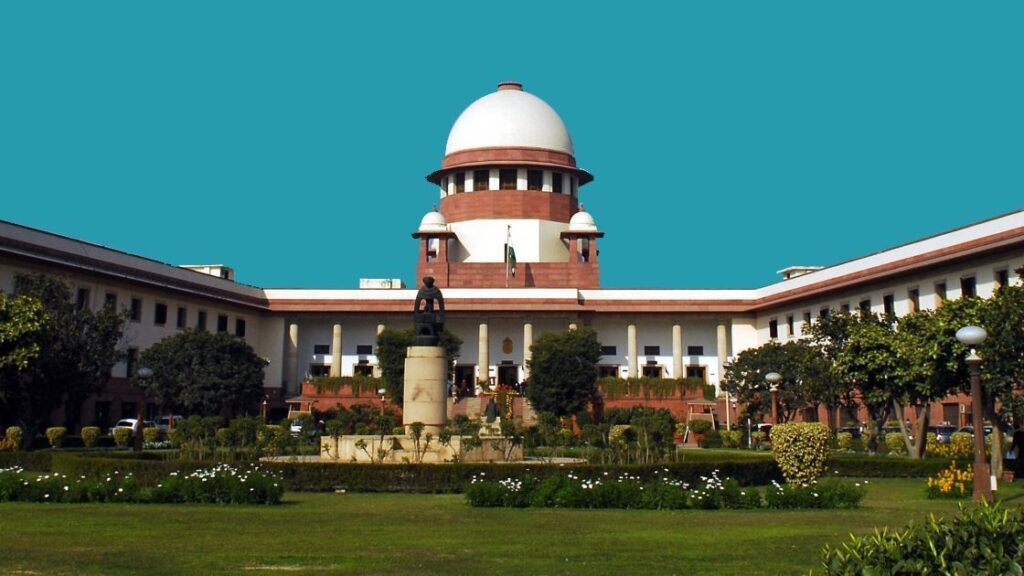
Would it not affect the Speaker’s impartiality if he could disqualify himself while a resolution to have him removed is pending? Asks Supreme Court.
Last Updated on February 18, 2023 by Administrator
The Supreme Court’s constitution bench began hearing arguments regarding constitutional issues resulting from the split in the Shiv Sena party between the Eknath Shinde and Uddhav Thackeray parties. The Nabam Rebia v. Deputy Speaker (2016) decision should be referred to a seven-judge Supreme Court bench, the bench heard during yesterday’s hearing. A five-judge panel concluded in Nabam Rebia that a Speaker cannot start the disqualification process while a motion to remove him is still on the table. The case was heard by the panel that included Chief Justice DY Chandrachud, Justices MR Shah, Krishna Murari, Hima Kohli, and PS Narasimha.
Senior Advocate Harish Salve, speaking on behalf of the Eknath Shinde faction, raised an initial objection, arguing that the petitioners themselves had relied on the Nabam Rebia v. Deputy Speaker decision at various points and were now contesting the same decision. Senior Advocate Kapil Sibal was speaking on behalf of the Uddhav Thackeray faction. After noting this, CJI DY Chandrachud said the bench would keep it in mind.
Senior Attorney Kapil Sibal then started presenting his case. His main contention was that the Speaker cannot perform his duties in the parliament or serve as a tribunal under the Tenth Schedule after a notice of resolution for the Speaker’s removal is moved, as per the ruling in Nabam Rebia. He claimed that as a result, regimes were overthrown. He stated: “According to Nabam Rebia, a speaker cannot serve as a tribunal under the Tenth Schedule once he receives a notice asking for his removal. Whether it be the government, the parliament, or anything else, constitutional authorities cannot be suspended at any time. He also ceases to be a tribunal. As a result, you overthrow the government, install the Chief Minister, and elect your own speaker. Speakers consistently support their own political parties, as history has shown.”
A speaker removal notice could only be given out when the legislature was in session, he stressed. He said the following to justify his logic: “I call for the speaker. I may not intend to move further with it, but I still issue it. Whether the person can move the residence or not, a request for leave is made. The resolution is discarded if 29 members vote against it. There isn’t a motion against the speaker until the resolution is moved, but the speaker is not allowed to talk after the notice is given! What was the purpose of the eleventh schedule? to advance political morality’s cause.
Currently, that is being undermined by this timetable, which is being abused. Only when the house is in session should a notice to remove a speaker be changed. This will stop all malpractice in its tracks. Otherwise, given your knowledge of our politics, you may overthrow governments whenever you like. Otherwise, knowing our politics, you can overthrow governments whenever you want. This probably will not happen if notice can only be given during house sessions and a decision must be made within seven days. It is a legally recognized position. There can never be a pause or a break.
Inquiring more about his submission, Justice Hima Kohli asked: So your proposal is that the entire procedure will be completed in that session?
Senior Counsel Sibal replied: “A member may move the notice at any time. See the result of it—he may move the notice even if he has no intention of doing so and even if the legislature is not in session? The ninth timetable is therefore constitutionally stopped while the assembly continues.”
CJI DY Chandrachud inquired at this point: “On the other hand, what would happen if we allowed the speaker to speak despite the grant of leave being crossed? What’s concerning is that you’re claiming that he can take any activities up until motion is made. The result is that he can then choose and actually influence how his removal will proceed. The only thing that worries me is this. Do we grant the speaker the authority to direct the process of his own removal? The speaker’s impartiality will be compromised if he is permitted to disqualify.”
Senior Advocate Sibal responded as follows: “My neutrality is taken for granted if I’m in a position of power under the Constitution. That is open to judicial scrutiny in terms of that. They may appeal if the disqualification was made on the incorrect grounds. When Justice MR Shah asked what the house would do while waiting for the judiciary to rule on the matter, Senior Advocate Sibal responded: Why would a trial take so long? Court proceedings should be quick. In each case of disqualification, that takes place. What distinguishes that situation from the one your lord is bringing up? If the speaker is dismissed, he is just dismissed from his position. However, the damage to politics if the elected government is overthrown is substantially higher.
The phrase “under consideration” in Article 181 of the Indian Constitution, according to Senior Advocate AM Singhvi, can only be interpreted in one way. He stated: There is only one way to interpret the phrase “under consideration” in Article 181. The word “sitting” refers to daily sitting rather than a session, hence it describes a day. In other words, the day of the resolution is being considered.
Added he: According to Nabam Rebia, a speaker can be silenced by a simple notification. As a result, the program for the tenth meeting is locked and it is now legal to silence a speaker who lacks authority. The most crucial factor is constitutional harmony and balance.
The hearing will continue today.
Case Title: Subhash Desai v. Principal Secretary, Government of Madras and Ors.
Writ petition No.: 493/2022
Written By – Srijan




